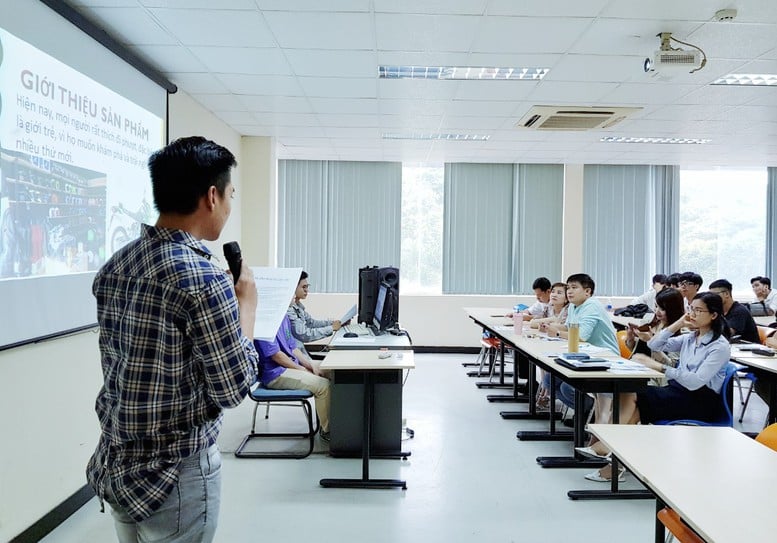
The e-commerce sector is facing many significant challenges in building human resources - Illustrative photo
Speaking with reporters of the Government Electronic Newspaper, Mr. Nguyen Huu Tuan, Director of the Center for E-commerce and Digital Economy Development (Department of E-commerce and Digital Economy, Ministry of Industry and Trade ), the biggest challenge is the shortage of high-quality human resources because the current labor market does not meet both the quantity and quality of human resources for the e-commerce industry, especially positions requiring high professional skills.
"The e-commerce field requires comprehensive knowledge from economics , information technology, management and foreign languages. Short-term training only solves the problem, while formal training programs are still limited in both quantity and quality," said Mr. Tuan.
Mr. Tuan acknowledged that a large number of students graduating from e-commerce-related majors are still heavy on theory, lacking practical experience and the necessary "real-life" skills to be able to start working immediately. This forces businesses to spend more time and money on retraining. Accordingly, only about 30% of human resources in e-commerce solution providers are properly and formally trained. The remaining 70% have to self-study or change majors from other fields such as marketing, information technology, and business.
In addition, fierce competition among e-commerce businesses, along with a shortage of quality candidates, makes recruitment extremely difficult. Businesses must invest a lot of resources in searching, attracting and screening candidates. Human resources are also particularly lacking in localities outside Hanoi and Ho Chi Minh City because the gap in e-commerce development between localities is quite far from the development level in these two localities.
In addition, Mr. Tuan said that in the context of high competition and great demand for human resources, retaining talented and experienced personnel is also a headache for businesses. Without a good remuneration policy, good working environment and clear development roadmap, businesses can easily lose people to competitors.
In addition, the e-commerce industry changes and updates technology very quickly. Therefore, employees in this industry need to continuously learn, improve their knowledge and skills to avoid falling behind. This requires businesses to have a systematic and continuous strategy for training and developing employees.
"Although many universities and colleges have opened training courses on e-commerce, the curriculum sometimes has not kept up with the rapid changes in technology, market trends and practical requirements from businesses. In addition, the connection between schools and businesses in building programs and practical training needs to be further strengthened," Mr. Tuan acknowledged.
Promoting comprehensive transformation in training
Regarding future orientations, Ms. Le Hoang Oanh, Director of the Department of E-commerce and Digital Economy (Ministry of Industry and Trade), said: The Ministry is promoting a plan to improve the quality of e-commerce human resource training. Specific solutions include: Revising training programs, updating learning materials, organizing internship support and increasing internship activities for students.
"In particular, developing a team of lecturers with updated knowledge according to new technology trends is considered a key factor. At the same time, the Ministry also advocates building a strong network of connections between universities, training institutes and businesses to create a training environment that is close to reality and suitable for the human resource needs of the market," Ms. Oanh emphasized.
One of the notable initiatives is the Go Online program implemented by the Center for E-commerce and Digital Technology Development. This program will be held in all 6 economic regions across the country, focusing on in-depth training on core e-commerce issues such as legal framework, tax regulations, business development strategies and digital advertising solutions. Thereby, the program will help equip businesses and young workers in the locality with knowledge and practical skills.
In parallel, Ms. Oanh said that the Department also coordinated with the Vietnam E-commerce Association to implement the Traditional Market Trader Support Program, aiming to train e-commerce business skills for about 300,000 traders nationwide. This program includes the development of a "Digital Transformation Handbook", skills training courses and separate livestream sales sessions, contributing to building a comprehensive, open and sustainable digital business community.

The Ministry of Industry and Trade is promoting a plan to improve the quality of e-commerce human resource training with specific solutions including: Amending training programs, updating learning materials, organizing internship support and increasing internship activities for students - Illustrative photo
Adapting to new technology
Mr. Nguyen Huu Tuan added that, in fact, e-commerce training programs are increasingly diverse and have changed dramatically thanks to the application of technology. Many universities have integrated courses related to new technologies in the Information Technology industry and related industries such as e-commerce and digital finance. Typically, subjects such as: AI applications in e-commerce (content production, videos, product images), Blockchain and cryptocurrencies, Artificial intelligence and machine learning in finance, Big data management and analysis have begun to appear in the training programs of some schools.
In addition, the Department of E-commerce and Digital Economy also proactively implements digital technology training programs for businesses and localities, aiming to raise awareness and capacity to apply technology to e-commerce activities throughout society.
Mr. Tuan added that, faced with the shortage of high-quality human resources and the strong fluctuations of the e-commerce industry, the idea of building a "custom-made" training program between the State and businesses is considered a potential direction.
This is a model that needs to be seriously studied because it has many advantages: The training program will be close to reality, flexibly updated with new trends, focusing on practice and experience, and at the same time creating an effective bridge between labor supply and demand. This also contributes to promoting the combined resources of both the State and enterprises.
However, Mr. Tuan believes that for this model to be truly effective and sustainable, there needs to be a clear and transparent coordination mechanism, a proactive coordinating role from the State and a strong commitment from businesses. More importantly, the training program, even if "ordered", needs to ensure that learners are equipped with basic knowledge and core skills, helping them adapt to the ever-changing e-commerce environment in the long term.
Anh Tho
Source: https://baochinhphu.vn/thi-truong-25-ty-usd-va-bai-toan-nhan-luc-cho-thuong-mai-dien-tu-viet-nam-102250516134749253.htm






























![[Photo] National Assembly Chairman Tran Thanh Man visits Vietnamese Heroic Mother Ta Thi Tran](https://vphoto.vietnam.vn/thumb/1200x675/vietnam/resource/IMAGE/2025/7/20/765c0bd057dd44ad83ab89fe0255b783)



































































Comment (0)